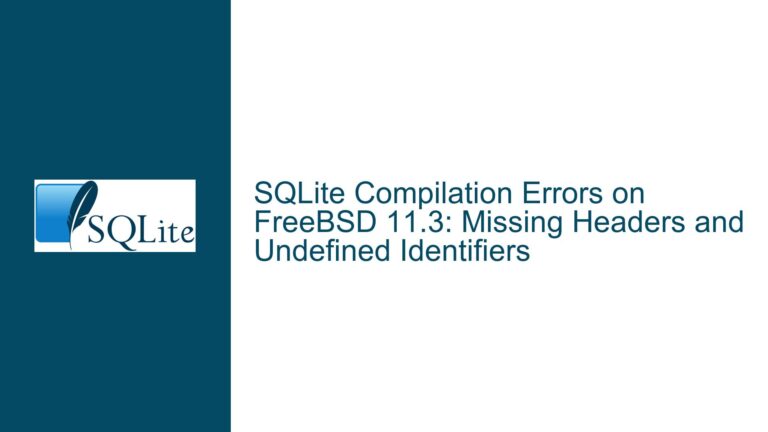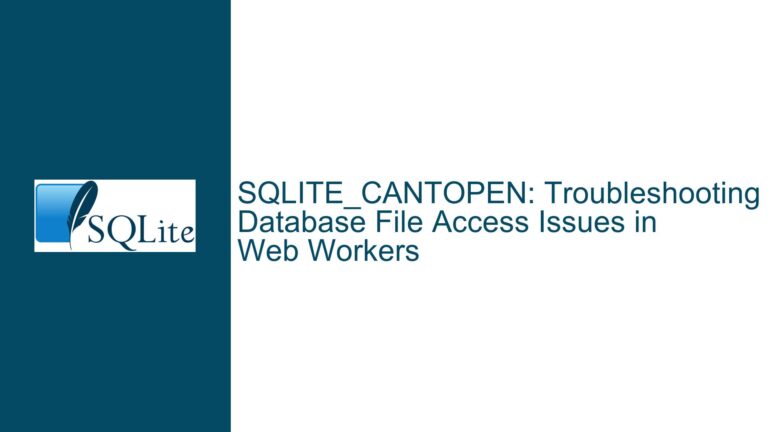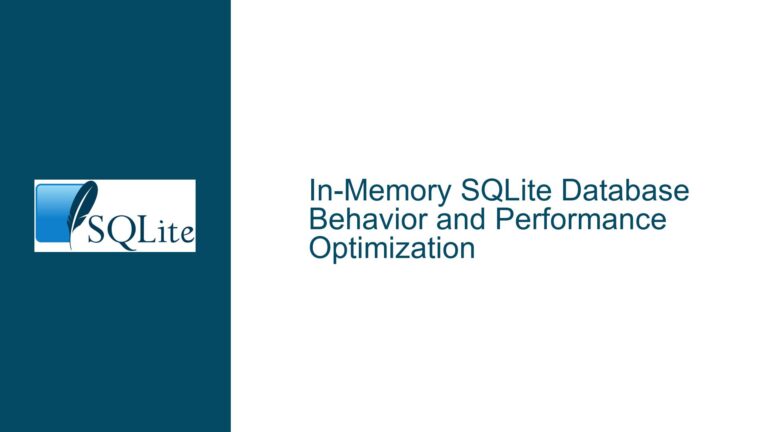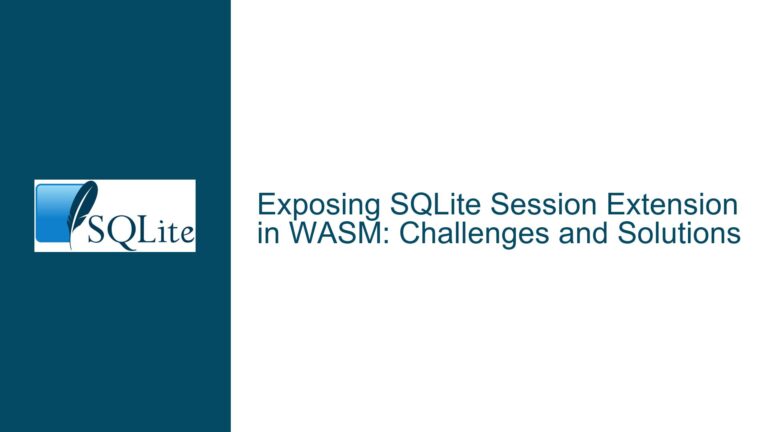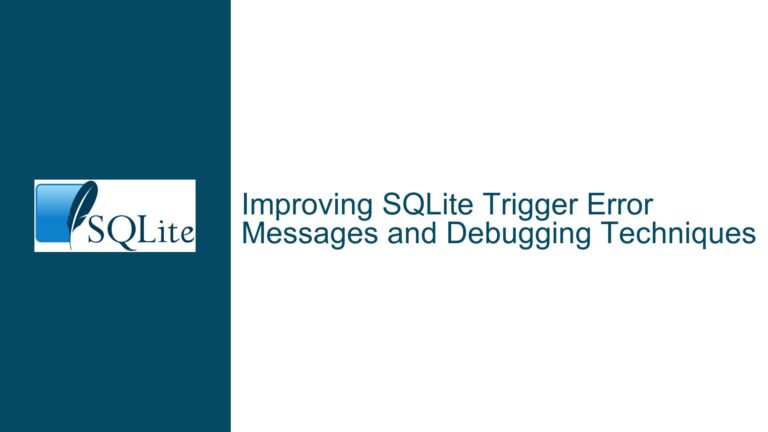Ambiguous Macro Expansion Warnings in SQLite on Xcode/OSX
Ambiguous Expansion of MIN and MAX Macros in SQLite Compilation
When compiling SQLite within Xcode on macOS, developers may encounter warnings related to the ambiguous expansion of the MIN and MAX macros. These warnings typically manifest as follows:
Ambiguous expansion of macro MIN
Ambiguous expansion of macro MAX
These warnings indicate that the compiler has encountered multiple definitions of the MIN and MAX macros, leading to ambiguity in which definition should be used during the compilation process. The issue arises because both SQLite and the system headers (specifically sys/param.h) define these macros, and the compiler is unable to resolve which definition should take precedence.
The MIN and MAX macros are commonly used in C programming to determine the smaller or larger of two values, respectively. In SQLite, these macros are defined within the sqlite3.c file, but they are also defined in the system headers, leading to potential conflicts. The SQLite definitions are typically guarded by #ifndef preprocessor directives to prevent redefinition, but the presence of multiple definitions can still cause warnings, especially in complex build environments like Xcode.
Multiple Definitions of MIN and MAX in SQLite and System Headers
The root cause of the ambiguous macro expansion warnings lies in the multiple definitions of the MIN and MAX macros within both SQLite and the system headers. Specifically, the sys/param.h file, which is included in the macOS SDK, contains its own definitions of these macros:
#ifndef MIN
#define MIN(a, b) (((a)<(b))?(a):(b))
#endif /* MIN */
#ifndef MAX
#define MAX(a, b) (((a)>(b))?(a):(b))
#endif /* MAX */
These definitions are guarded by #ifndef to prevent redefinition, but they can still conflict with the definitions provided by SQLite. Within SQLite, the MIN and MAX macros are defined in several places, often with slightly different syntax or parameter names. For example, in sqliteInt.h, the macros are defined as:
#ifndef MIN
# define MIN(A,B) ((A)<(B)?(A):(B))
#endif
#ifndef MAX
# define MAX(A,B) ((A)>(B)?(A):(B))
#endif
In other parts of SQLite, such as fts3Int.h and rtree.c, the macros are defined with different parameter names (x and y instead of A and B). Additionally, in fts5.c, there is an unguarded definition of these macros, which is wrapped in a #ifndef SQLITE_AMALGAMATION block:
#define MIN(x,y) (((x) < (y)) ? (x) : (y))
#define MAX(x,y) (((x) > (y)) ? (x) : (y))
The presence of these multiple definitions, combined with the inclusion of system headers, creates a situation where the compiler cannot determine which definition of MIN and MAX to use, leading to the ambiguous expansion warnings.
Resolving Ambiguous Macro Expansion Warnings in Xcode
To resolve the ambiguous macro expansion warnings, several steps can be taken. These steps involve modifying the build environment, adjusting the SQLite source code, or configuring the compiler settings to suppress or resolve the warnings.
Step 1: Verify the SQLite Version and Macro Definitions
The first step is to verify the version of SQLite being used and ensure that the macro definitions are properly guarded. In SQLite version 3.33.0, the MIN and MAX macros are defined in sqliteInt.h with the following guards:
#ifndef MIN
# define MIN(A,B) ((A)<(B)?(A):(B))
#endif
#ifndef MAX
# define MAX(A,B) ((A)>(B)?(A):(B))
#endif
These guards should prevent redefinition if the macros are already defined. However, if the SQLite source code is being compiled as part of a larger project, it is possible that the system headers are being included before the SQLite headers, leading to the system definitions taking precedence. To address this, ensure that the SQLite headers are included before any system headers that might define MIN and MAX.
Step 2: Use Compiler Flags to Suppress Warnings
If the warnings are not critical and can be safely ignored, they can be suppressed using compiler flags. In Xcode, this can be done by adding the -Wno-ambiguous-macro flag to the compiler options. This flag tells the compiler to ignore warnings related to ambiguous macro expansions. To add this flag in Xcode:
- Open the Xcode project.
- Select the project in the Project Navigator.
- Go to the "Build Settings" tab.
- Find the "Other Warning Flags" setting (usually under the "Apple Clang – Warning Policies" section).
- Add
-Wno-ambiguous-macroto the list of flags.
This will suppress the warnings related to the ambiguous expansion of MIN and MAX macros.
Step 3: Modify the SQLite Source Code
If suppressing the warnings is not desirable, the SQLite source code can be modified to ensure that the MIN and MAX macros are defined consistently and do not conflict with the system headers. One approach is to undefine the macros at the top of the sqlite3.c file and then redefine them with the desired behavior:
#undef MIN
#undef MAX
#define MIN(A,B) ((A)<(B)?(A):(B))
#define MAX(A,B) ((A)>(B)?(A):(B))
This ensures that the SQLite definitions of MIN and MAX are used consistently throughout the compilation process, regardless of any definitions that may be present in the system headers.
Step 4: Use Preprocessor Directives to Control Macro Definitions
Another approach is to use preprocessor directives to control the inclusion of system headers that define MIN and MAX. For example, if the sys/param.h file is being included as part of the build process, it can be conditionally included based on whether the MIN and MAX macros have already been defined:
#ifndef MIN
#include <sys/param.h>
#endif
This ensures that the system definitions of MIN and MAX are only included if they have not already been defined by SQLite or another part of the codebase.
Step 5: Compile SQLite Outside of Xcode
If the warnings persist and are causing significant issues, an alternative approach is to compile SQLite outside of Xcode using the command line. This allows for greater control over the compilation process and can help isolate the source of the warnings. To compile SQLite from the command line, use the following command:
clang -Wall -c sqlite3.c -o sqlite3.o
This command compiles the sqlite3.c file into an object file (sqlite3.o) and enables all warnings (-Wall). If the compilation completes without warnings, the resulting object file can be linked into the Xcode project, bypassing the ambiguous macro expansion warnings.
Step 6: Investigate Compiler-Specific Behavior
The ambiguous macro expansion warnings may be specific to the version of the Clang compiler used by Xcode. Different versions of Clang may handle macro expansions differently, and some versions may be more prone to issuing warnings in situations where multiple definitions exist. To investigate this, try compiling the SQLite source code with different versions of Clang or with different compiler settings. For example, the -E flag can be used to generate preprocessed output, which can be examined to see how the MIN and MAX macros are being expanded:
clang -E sqlite3.c -o sqlite3.i
This command generates a preprocessed version of the sqlite3.c file (sqlite3.i), which can be opened in a text editor to inspect the macro expansions. This can help identify where the ambiguity is occurring and which definitions are being used.
Step 7: Report the Issue to the SQLite Development Team
If the warnings persist and are causing significant issues, consider reporting the issue to the SQLite development team. The SQLite source code is actively maintained, and the developers may be able to provide a fix or workaround for the issue. When reporting the issue, provide detailed information about the version of SQLite being used, the version of Xcode and Clang, and the specific warnings that are being encountered. This will help the developers reproduce the issue and provide a solution.
Conclusion
The ambiguous expansion of MIN and MAX macros in SQLite when compiling within Xcode on macOS is a common issue that can be resolved through a combination of modifying the build environment, adjusting the SQLite source code, and using compiler flags to suppress warnings. By understanding the root cause of the issue and following the steps outlined above, developers can effectively resolve these warnings and ensure a smooth compilation process.

